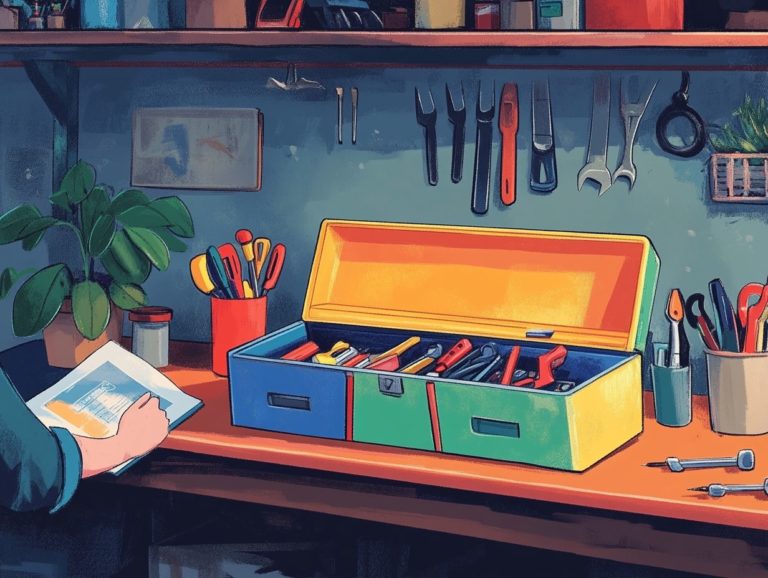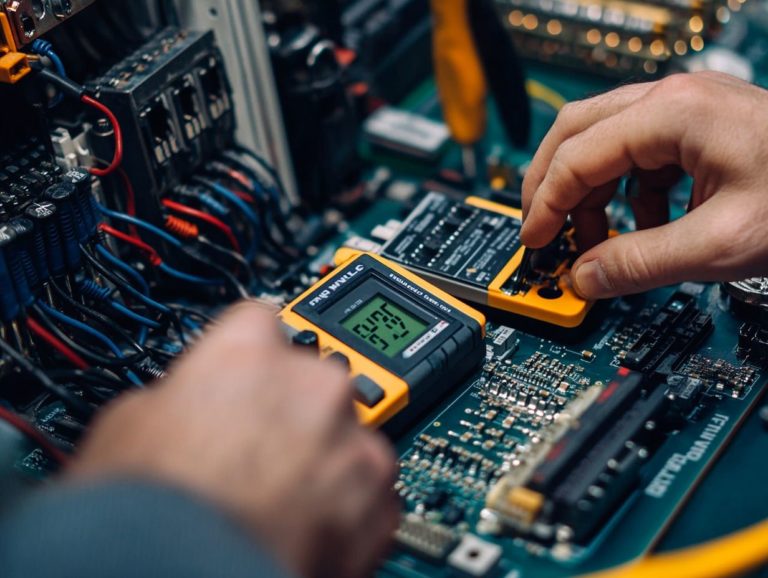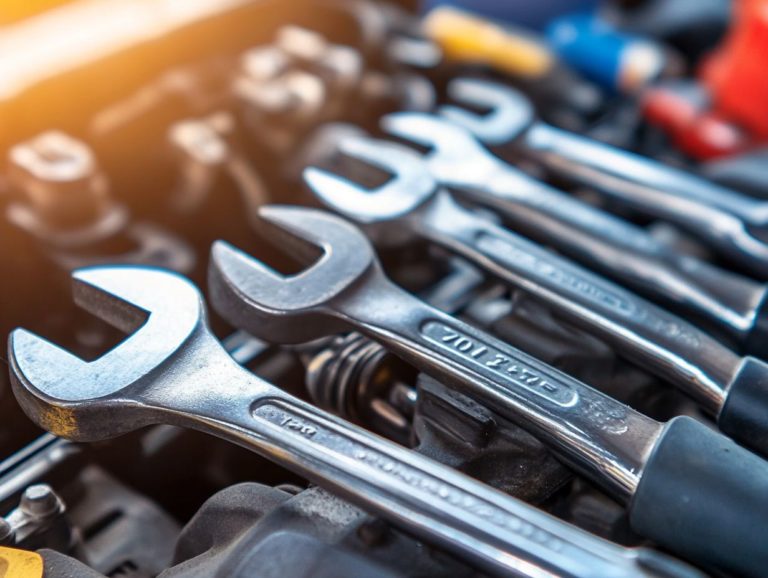5 Signs Your Car Needs a Tune-Up
Is your car feeling a bit off, not quite gliding down the road like it used to? A tune-up could be just what it requires.
Here are five unmistakable signs that suggest your vehicle is overdue for a check-up:
- Misfires
- Dwindling fuel efficiency
- Odd noises
- Pesky dashboard warnings
Understanding a tune-up can save you money and keep your car running smoothly! Regular maintenance can spare you from significant repair costs later on. Keep your ride in pristine condition and pay attention to those warning signs to avoid the pitfalls of neglect.
Contents
Key Takeaways:

- Engine misfires or stalling could be a sign that your car needs a tune-up.
- If your car’s fuel efficiency has decreased, it may be time for a tune-up.
- Difficulty starting your car or strange noises/vibrations can indicate a need for a tune-up.
1. Engine Misfires or Stalls
Engine misfires or stalls can be quite alarming for you as a vehicle owner. These symptoms often hint at underlying issues that require your immediate attention.
Factors such as faulty spark plugs or problems with the ignition system can lead to these symptoms, ultimately affecting your car s performance and lifespan. By understanding these signs early, you can prevent further engine complications and avoid costly repairs.
The ignition system is the part that starts your engine, igniting the air-fuel mixture to generate the power necessary for movement. Within this system, spark plugs play a crucial role by creating the spark needed for combustion. When these plugs wear out or become fouled, they can struggle to ignite the mixture efficiently, leading to misfires.
If the ignition coils or wiring are compromised, the flow of electricity could be disrupted, resulting in irregular engine behavior. Ignoring these misfires not only diminishes fuel efficiency but can also cause long-term damage to engine components.
Thus, regular automotive diagnostics and timely mechanical repairs are essential for maintaining the health of your vehicle.
2. Decreased Fuel Efficiency
Decreased fuel efficiency doesn t just hit your wallet; it could also signal serious issues lurking in your vehicle’s fuel system or engine.
When you encounter problems like clogged air filters or faulty fuel filters, it often leads to reduced fuel economy and a host of driving difficulties. Regular maintenance is key to spotting and addressing these issues before they spiral out of control.
A clean air filter ensures optimal airflow, promoting better combustion and enhancing your engine’s overall performance. If you let it slide, a dirty filter forces the engine to work harder, leading to higher fuel consumption.
Remember to replace the fuel filter regularly to keep debris from clogging the fuel injectors, as this can also hinder efficiency.
Adopting simple practices, such as ensuring your tires are properly inflated and avoiding sudden accelerations, can make a noticeable difference in your fuel economy. By staying proactive with maintenance tasks, you can save on fuel costs and enjoy a smoother, more reliable driving experience.
3. Difficulty Starting the Car
Experiencing difficulty starting your car can be incredibly frustrating and concerning. This often hints at potential battery issues or faults in the ignition system.
A reliable ignition key and a fully charged battery are crucial for optimal engine performance. If you overlook these symptoms, you might find yourself facing more severe problems that could require extensive mechanical repairs.
Starting difficulties often stem from aging batteries or worn ignition components, which can deteriorate without warning. It s essential to understand that battery health is pivotal; a weak battery may not deliver the necessary power, while a malfunctioning ignition system can disrupt the spark needed to ignite the fuel.
To avoid unexpected breakdowns and costly repairs, regular inspections by a qualified mechanic are highly advisable. During these check-ups, the mechanic can identify any warning signs, ensuring that both your battery and ignition system remain in peak condition.
This proactive approach not only extends your vehicle’s lifespan but also enhances its reliability.
4. Strange Noises or Vibrations
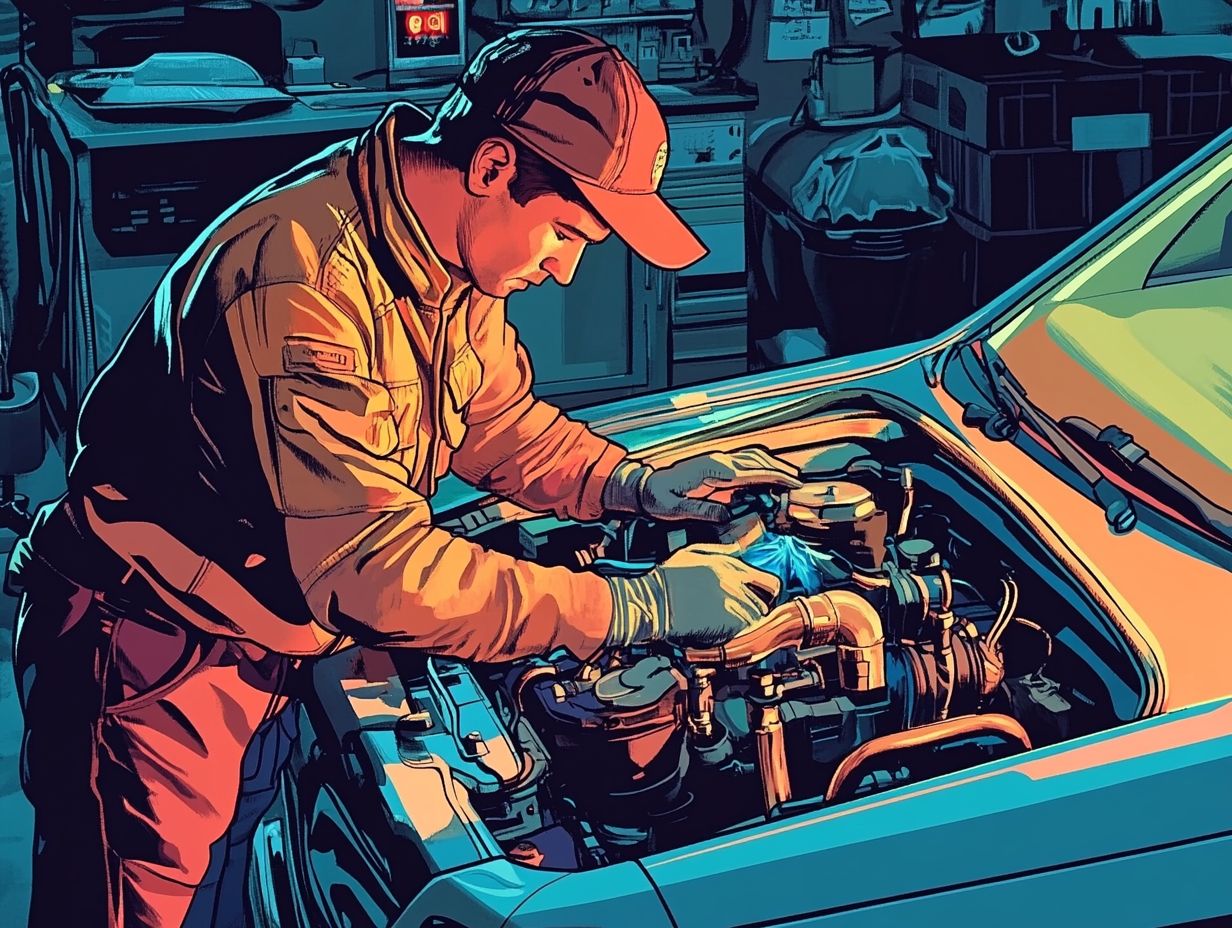
Strange noises or vibrations while driving can signal various issues. They may range from brake problems to engine overheating.
Unusual vibrations can compromise your vehicle s performance and safety. They often indicate faults in critical systems like the exhaust or suspension.
Hearing squeaking or grinding sounds? It may mean your brake pads are worn.
Rattles might signify loose components in your exhaust. Vibrations through the steering wheel could point to alignment issues or tire imbalance.
Regular vehicle inspections help catch these odd sounds early. Addressing wear and tear promptly can prevent serious problems.
5. Warning Lights on the Dashboard
Warning lights on your dashboard are crucial indicators of your vehicle’s health. They alert you to issues needing immediate attention, like a check engine light.
Understanding these signals can guide you to necessary diagnostics and maintenance. This ultimately enhances safety and performance.
Each light has a specific purpose, often indicating problems with engine performance, transmission, or brake system issues.
The check engine light is noteworthy; it can signal anything from a loose gas cap to serious engine troubles.
Regular emission testing helps ensure compliance with regulations. It also aids in identifying potential engine inefficiencies.
What Is a Car Tune-Up and Why Is It Necessary?
A car tune-up is essential for vehicle maintenance. It helps improve engine performance and extends your vehicle’s lifespan by addressing key components.
Regular tune-ups keep your car running smoothly. They also help you avoid issues like engine overheating and drops in fuel efficiency.
During a tune-up, inspections check the air filter, fuel injectors, and ignition systems. Ensuring each part works well enhances operational efficiency and safety.
The long-term benefits of routine tune-ups are remarkable. You can expect improved gas mileage, reduced emissions, and lower repair costs by catching minor issues early.
What Are the Common Components of a Car Tune-Up?
The common components of a car tune-up include essential parts like spark plugs, fuel filters, engine oil, and brake pads. These parts are vital for your vehicle’s health. Regular servicing ensures optimal performance, improved fuel efficiency, and enhanced safety while driving. Neglecting them can lead to reduced performance and increased repair costs.
Each of these elements is critical to your vehicle’s functionality. For example, spark plugs help ignite the fuel in your engine, impacting fuel efficiency and performance. They should be checked every 30,000 miles or replaced as needed. Fuel filters keep contaminants out of the engine and should be replaced every 20,000 to 40,000 miles. Engine oil is crucial for lubrication and cooling; change it regularly typically every 5,000 to 7,500 miles to prevent wear. Brake pads are essential for safe stopping and require inspection every 10,000 miles.
Staying proactive with these components significantly reduces the risk of unexpected breakdowns and extends your vehicle’s longevity.
How Often Should a Car Receive a Tune-Up?
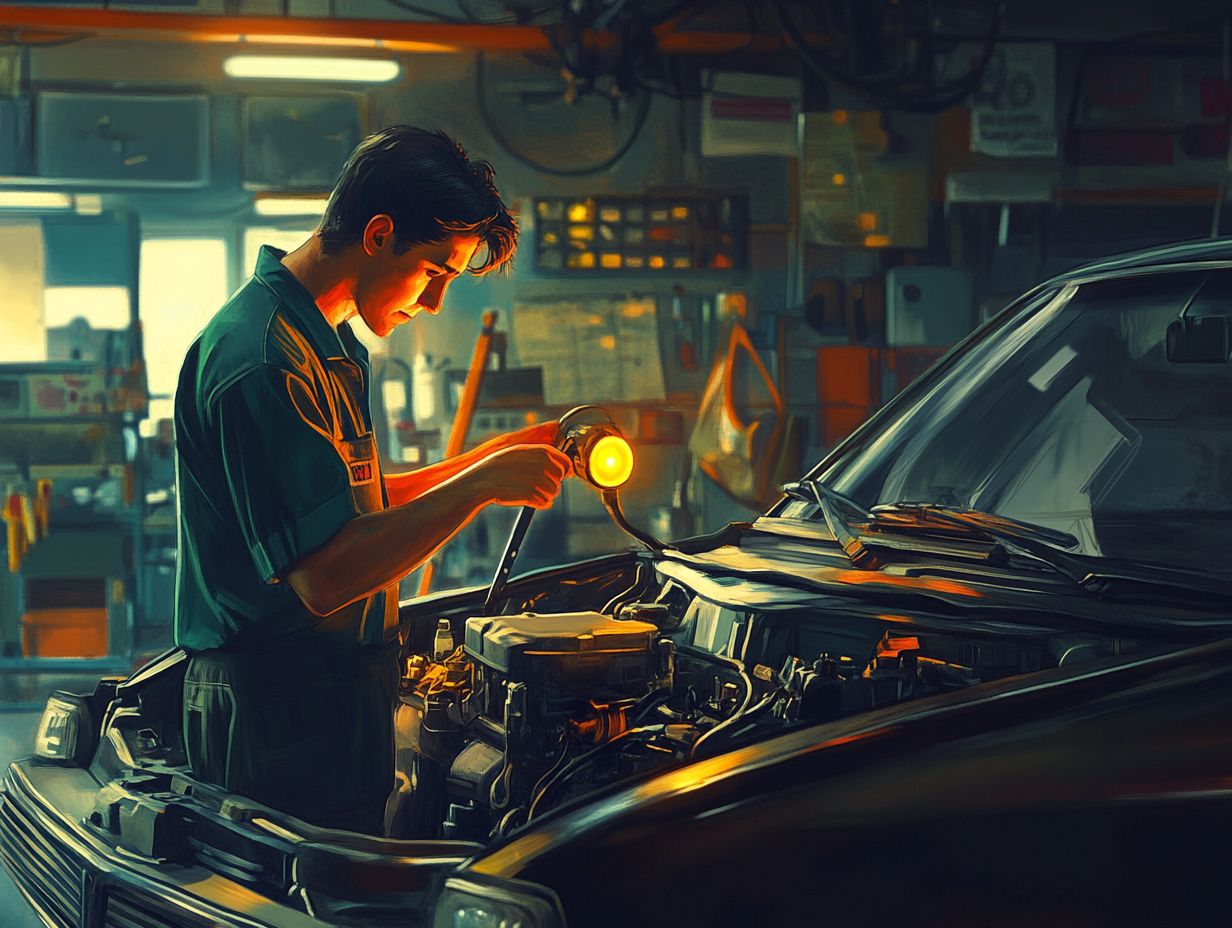
A car typically needs a tune-up every 30,000 miles or according to your vehicle’s maintenance schedule. This schedule is tailored to your driving conditions and habits. Adhering to it can significantly extend your vehicle’s lifespan and minimize unexpected repairs.
If you frequently drive in stop-and-go traffic or tackle rough terrains, your maintenance needs may arise sooner than expected. The age of your vehicle also matters; older models often need more attention due to worn parts.
Manufacturers provide specific tune-up guidelines that consider various factors, making it essential to familiarize yourself with their recommendations. Regular inspections by a qualified mechanic can help catch potential issues before they escalate, ensuring your car operates efficiently and safely.
What Are the Benefits of Regular Car Tune-Ups?
Regular car tune-ups offer numerous benefits, including enhanced fuel efficiency, improved driving performance, and an extended vehicle lifespan. They are a vital part of your preventative maintenance routine. By addressing issues early, you can save significantly on future repairs and enjoy a safer driving experience.
- A well-tuned engine burns fuel more efficiently, often leading to noticeable savings at the pump.
- Drivers have reported up to a 10% increase in fuel economy after maintenance.
- Issues like worn spark plugs or dirty air filters can negatively affect acceleration and handling, making for a less enjoyable ride.
- Regular tune-ups also help prevent serious safety issues, such as brake failure, by ensuring all components function optimally.
- Those who stick to a regular maintenance schedule experience smoother drives and encounter fewer unexpected breakdowns.
Don t wait until it s too late! Schedule your tune-up today and enjoy a safer driving experience!
How Can a Car Owner Tell If Their Car Needs a Tune-Up?
You can easily identify the need for a tune-up by watching for a few key signs. Look for difficulties in driving smoothly, unusual engine noises, or dashboard warning lights that hint at engine problems—these are all signs your car needs a tune-up.
Utilizing a diagnostic system can provide further clarity, helping you pinpoint specific issues that need addressing. These symptoms include decreased fuel efficiency, a rough idle, or an increase in exhaust emissions.
If you notice these signs, don’t wait! Consult a professional mechanic immediately to avoid bigger issues.
This process typically involves checking your engine’s performance measurements, examining the spark plugs, and assessing the fuel system. By addressing these concerns early, you can enhance your vehicle s longevity significantly.
You ll also enjoy a smoother driving experience.
What Are the Consequences of Ignoring the Signs That a Car Needs a Tune-Up?
Ignoring the signs that your car needs a tune-up can lead to a cascade of issues, including significant engine troubles and decreased fuel efficiency. Be aware of signs your car needs immediate maintenance to avoid heightened safety risks while driving.
Putting off essential vehicle maintenance may result in costly repairs down the line and shorten your car’s lifespan. Consider this: a minor engine misfire might seem insignificant at first, but if you neglect it, it could snowball into a complete engine failure.
Similarly, worn spark plugs or dirty air filters can undermine your engine’s performance, resulting in reduced power and potentially perilous situations on the road. Regular tune-ups are not just important for extending your vehicle’s life; they re vital for ensuring the safety of everyone in the car.
Timely safety inspections can catch these issues before they escalate, making them a crucial aspect of responsible car ownership. It s a wise investment in enhancing your driving experience.
Frequently Asked Questions
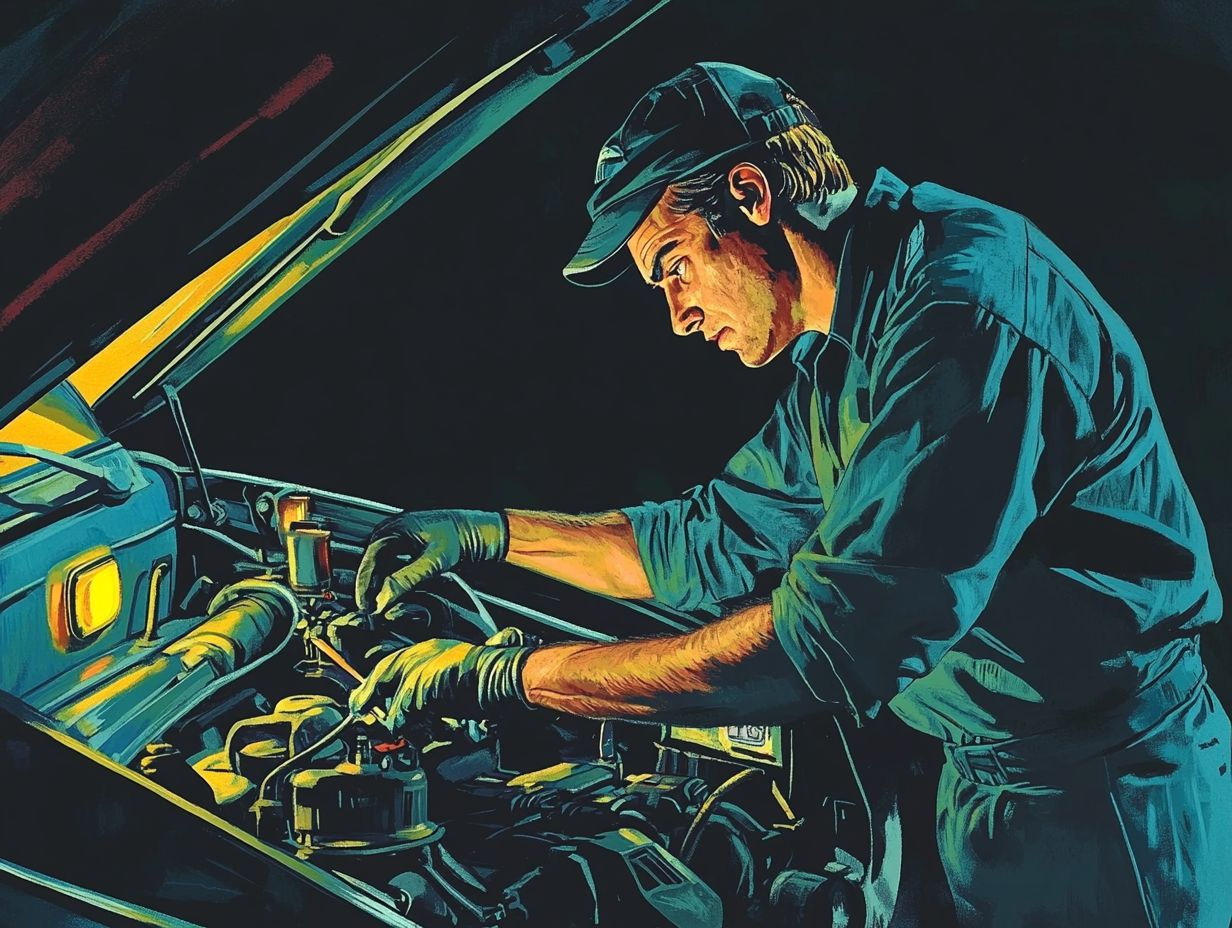
What are the top 5 signs that my car needs a tune-up?
The top 5 signs that your car needs a tune-up are:
- Decreased fuel efficiency
- Difficulty starting the engine
- Strange noises or vibrations
- Warning lights on the dashboard
- Irregular engine performance
How often should I get a tune-up for my car?
It is recommended to get a tune-up for your car every 30,000 miles or every 2 years, whichever comes first. However, if you notice any of the 5 signs mentioned earlier, it’s best to get a tune-up immediately.
What happens during a car tune-up?
During a car tune-up, a mechanic will check and replace various components of your car’s engine, such as spark plugs, filters, and fluids. They will also perform a diagnostic test to ensure that all systems are functioning properly.
Can I do a tune-up on my own?
While some basic maintenance tasks can be done at home, it is best to leave a tune-up to a professional mechanic. They have the necessary tools and expertise to properly diagnose and fix any issues with your car’s engine.
Is a tune-up expensive?
The cost of a tune-up can vary depending on the make and model of your car, as well as any additional repairs needed. However, it is generally more cost-effective to get a tune-up rather than waiting for a major issue to arise.
What are the benefits of getting a car tune-up?
Getting a car tune-up can improve the overall performance and efficiency of your car. It can also help prevent more costly repairs down the road and extend the lifespan of your vehicle.



